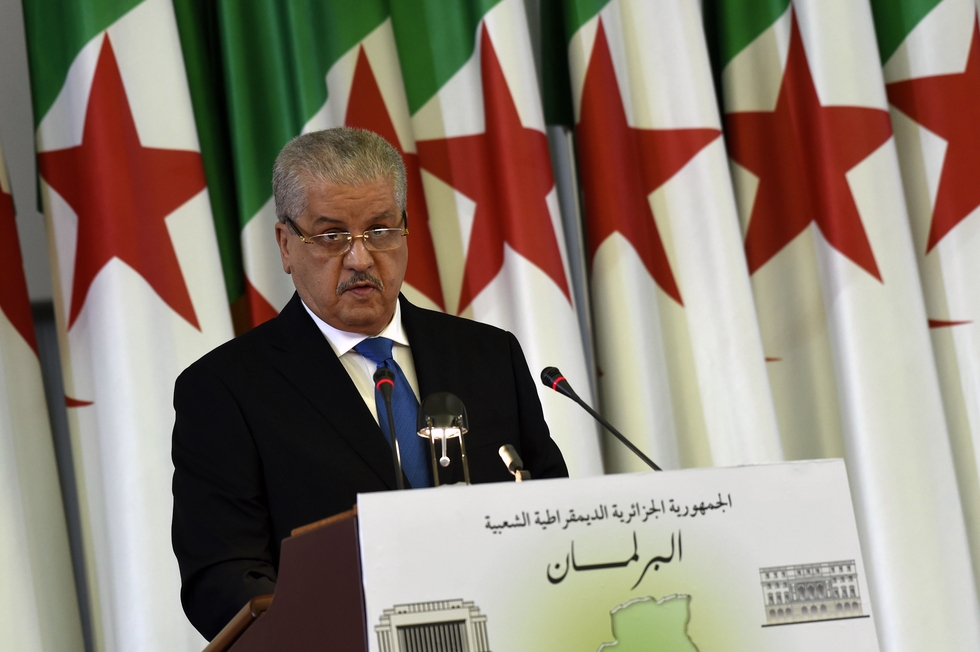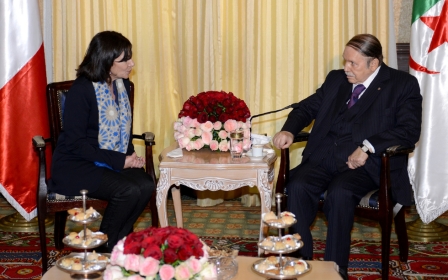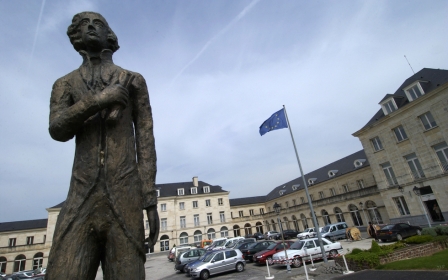Algeria's presidency: How the grooming process really works

Popular Algerian stand-up comic Mohamed Fellag famously described in one of his sketches how the youths of his generation learnt the art of decoding state-run TV.
It was in the last days of 1978 when the national broadcaster RTA aired a documentary on elephants. One large majestic member of the herd left the group, stumbled and crashed to the earth: the powerful animal was dead.
Immediately the word was out on the street: "Hey brother...Boumediene...may god rest his soul."
By the next morning the Algerian street was abuzz with news that the president had died. Come the evening bulletin, the official statement from the presidency confirmed what most people already knew.
And so generations of Algerians have grown up looking to decipher the often enigmatic messages national television attempts to propagate.
Lately one thing has become apparent watching state television: one figure has become ubiquitous, inaugurating projects, welcoming foreign dignitaries, joking about football. Abdelmalek Sellal, the country's prime minister, is everywhere. So much so that news of the ailing president has been eclipsed in favour of the more energising image of the athlete-like silhouette of his premier doing what many would have expected the president to do.
Since Abdelaziz Bouteflika's re-election to the helm of the country in 2014, ill health has blighted his fourth term in office, leading to criticism that he is not fit to do the job, while his evident ill-heath has ultimately proved the critics right.
Bouteflika appears frail every time he is seen at an official event on the rare occasions he appears for the camera. Yet increasingly his presence is barely felt across the country.
Once a visible politician travelling the length and depth of Algeria for public engagements, Bouteflika is today almost a recluse, making occasional appearances that ultimately further fuel speculation of his imminent death.
Meet the new boss
Contrast that with Sellal, who in the past few months has been everywhere. His omnipresence is designed to show the country continues to be governed despite the president's poor health, yet what Algerians are really reading is the manifesto for the upcoming presidential elections of 2019.
Sellal's regular TV appearances are being interpreted in the same way as the animal documentary of the 70s - as a subliminal message to Algerians to be ready for their next leader.
He is overly visible in a country were aloofness and politics often go hand in hand. His affable and pleasant persona is being pushed to an eager audience hungry for political leadership.
Aside from the daily running of the country, Algerians are also upset at not being kept in the loop. It's often as if the people are peripheral to the decision-making process they are invited to approve once every five years at election time.
Just as in any other country where public opinion is rarely taken into account unless to confirm a pre-approved appointment or to sign up to war, Algeria is no exception. However, the guessing game, as opposed to clear statements about what is happening, is increasingly frustrating for a population that simply wants to be informed.
Algerians want to know how their president is doing, whether he is still running the country, whether he will finish his mandate. Yet the political establishment simply continues as if nothing is wrong.
In more recent months, and in particular following a disturbing picture posted on the French prime minister's Twitter account of his meeting with the Algerian leader looking haggard, questions turned to anger.
Why was the president kept in place despite his condition? Was it not cruel to force a now elderly man to remain in a post that is too arduous for him?
What was previously anger at the president himself turned to anger at his entourage for failing to protect their frail yet prized leader.
Sellal steps forward
Algerian TV, otherwise known as the PR service of the government, stepped in to reveal the man who was in charge. The towering figure of Sellal is designed to reassure and so far the reaction has been positive. Despite often being mocked for his clumsy turn of phrases - he is an abysmally poor speaker - his approachable manner and sense of humour have made him a popular political figure.
He also boasts a decent record in his previous role as hydraulics minister when he took on the entire restructuring of the water systems, curing in the space of one term the age-old ills that affected millions of people suffering from water shortages.
Today water cuts, a once regular occurrence for thousands of people, are a rarity.
Sellal is also proving agile in promoting himself without tarnishing the president in the process. He is shrewdly associating himself with all of Bouteflika's successes such as returning the country to peace after the civil unrest of the 90s as well as investing oil money in essential infrastructure works that have transformed large parts of the country.
Falling revenues, dangerous neighbourhood
All the while he is appearing to be the reassuring figure for the nation, promising that tumbling oil prices still won't affect the country as the government has put in place sufficient measures to cushion the predicted fall in revenues.
It's fair to say that at a time of ongoing turmoil around the country, namely in Libya and to a lesser extent in Tunisia, Algerians are fearful of any major upheavals that could lead the country down similar paths, yet are nevertheless expressing their disapproval of the "status quo" of a government intent on resting on its laurels.
Earlier this year the rehabilitation of former oil minister Chakib Khalil left a bitter taste of injustice among many observers.
Khalil, said to have dual US-Algerian citizenship, fled the country when it emerged in Italian media that he was involved in a massive corruption scandal between Italian oil major Eni and Algerian oil producer Sonatrach.
Rather than staying on to clear his name, the former minister left only to return a few years later when a judge announced there were no grounds for accusations levelled against him.
His very arrogant return through VIP rooms and later televised meetings with local dignitaries infuriated many who saw this as Bouteflika's blessing of Khalil and his alleged criminal activities.
The very overt support the government expressed led many to even assume Khalil was being groomed for power. But at 74 and with such a cloud hanging over his head, his appointment or nomination appears unlikely. Also as a result of the infamous Sonatrach Eni scandal, he remains a deeply unpopular politician.
Besides, Algerian TV's subliminal message is abundantly clear and the word on the street appears to confirm it: the elephant in the presidential room is very likely to be Sellal.
- Hafsa Kara-Mustapha is a journalist, political analyst and commentator with a special focus on the Middle East and Africa. She has worked for the FT group and Reuters and her work has been published in the Middle East magazine, Jane's Foreign report and a host of international publications. A regular pundit on TV and radio, Hafsa can regularly be seen on RT and Press TV.
The views expressed in this article belong to the author and do not necessarily reflect the editorial policy of Middle East Eye.
Photo: Algerian Prime Minister Abdelmalek Sellal addresses a gathering of parliamentarians during a vote on a package of constitutional reforms on 7 February, 2016, in the capital Algiers (AFP).
Middle East Eye propose une couverture et une analyse indépendantes et incomparables du Moyen-Orient, de l’Afrique du Nord et d’autres régions du monde. Pour en savoir plus sur la reprise de ce contenu et les frais qui s’appliquent, veuillez remplir ce formulaire [en anglais]. Pour en savoir plus sur MEE, cliquez ici [en anglais].





